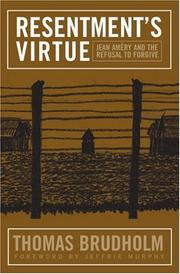| Listing 1 - 6 of 6 |
Sort by
|
Book
ISBN: 9789061316923 Year: 2008 Publisher: Utrecht,
Abstract | Keywords | Export | Availability | Bookmark
 Loading...
Loading...Choose an application
- Reference Manager
- EndNote
- RefWorks (Direct export to RefWorks)
241.4 --- Deadly sins --- Capital sins --- Seven capital sins --- Seven deadly sins --- Sins, Capital --- Sins, Deadly --- Sins --- Sin, Mortal --- 241.4 Theologische ethiek: schuld; zonde; bekering; verzoening --- Theologische ethiek: schuld; zonde; bekering; verzoening
Book
ISBN: 9782204085311 2204085316 Year: 2008 Publisher: Louvain-la-Neuve: Paris: Université catholique de Louvain, Faculté de théologie, Cerf,
Abstract | Keywords | Export | Availability | Bookmark
 Loading...
Loading...Choose an application
- Reference Manager
- EndNote
- RefWorks (Direct export to RefWorks)
Sin --- Theology, Doctrinal --- Péché --- Théologie dogmatique --- Christianity --- Christianisme --- Guilt --- Morals --- christianity --- #GGSB: Sacramenten --- #GGSB: Verzoening --- 241.4 --- Theologische ethiek: schuld; zonde; bekering; verzoening --- Conferences - Meetings --- 241.4 Theologische ethiek: schuld; zonde; bekering; verzoening --- Péché --- Théologie dogmatique --- History of doctrines --- Sacramenten --- Verzoening --- Guilt - christianity --- Sin - Christianity - History of doctrines - Congresses

ISBN: 0812240448 1322510415 0812201515 9780812240443 9780812224276 Year: 2008 Publisher: Philadelphia University Of Pennsylvania Press
Abstract | Keywords | Export | Availability | Bookmark
 Loading...
Loading...Choose an application
- Reference Manager
- EndNote
- RefWorks (Direct export to RefWorks)
Virginia Burrus explores one of the strongest and most disturbing aspects of the Christian tradition, its excessive preoccupation with shame. While Christianity has frequently been implicated in the conversion of ancient Mediterranean cultures from shame- to guilt-based and, thus, in the emergence of the modern West's emphasis on guilt, Burrus seeks to recuperate the importance of shame for Christian culture. Focusing on late antiquity, she explores a range of fascinating phenomena, from the flamboyant performances of martyrs to the imagined abjection of Christ, from the self-humiliating disciplines of ascetics to the intimate disclosures of Augustine. Burrus argues that Christianity innovated less by replacing shame with guilt than by embracing shame. Indeed, the ancient Christians sacrificed honor but laid claim to their own shame with great energy, at once intensifying and transforming it. Public spectacles of martyrdom became the most visible means through which vulnerability to shame was converted into a defiant witness of identity; this was also where the sacrificial death of the self exemplified by Christ's crucifixion was most explicitly appropriated by his followers. Shame showed a more private face as well, as Burrus demonstrates. The ambivalent lure of fleshly corruptibility was explored in the theological imaginary of incarnational Christology. It was further embodied in the transgressive disciplines of saints who plumbed the depths of humiliation. Eventually, with the advent of literary and monastic confessional practices, the shame of sin's inexhaustibility made itself heard in the revelations of testimonial discourse. In conversation with an eclectic constellation of theorists, Burrus interweaves her historical argument with theological, psychological, and ethical reflections. She proposes, finally, that early Christian texts may have much to teach us about the secrets of shame that lie at the heart of our capacity for humility, courage, and transformative love.
Shame --- Religious aspects --- Christianity. --- Honte --- Aspect religieux --- Christianisme --- Christian moral theology --- Christian church history --- History of civilization --- 241.4 --- 265.6 --- 265.6 Boetesacrament. Biecht --- Boetesacrament. Biecht --- 241.4 Theologische ethiek: schuld; zonde; bekering; verzoening --- Theologische ethiek: schuld; zonde; bekering; verzoening --- Humiliation. --- Emotions --- Ancient Studies. --- Cultural Studies. --- Literature. --- Religion.
Book
ISBN: 9782503528571 2503528570 Year: 2008 Volume: 50 Publisher: Turnhout: Brepols,
Abstract | Keywords | Export | Availability | Bookmark
 Loading...
Loading...Choose an application
- Reference Manager
- EndNote
- RefWorks (Direct export to RefWorks)
Bloomfield, Morton W. --- Incipits --- 091:24 --- 091:241.4/.5 --- 241.4 --- 091 =71 --- 870.9003 --- Handschriftenkunde. Handschriftencatalogi-:-Praktische theologie --- Handschriftenkunde. Handschriftencatalogi-:-Zonde. Deugd en ondeugd --- Theologische ethiek: schuld; zonde; bekering; verzoening --- Handschriftenkunde. Handschriftencatalogi--Latijn --- Literature Latin 750-1350 --- 091:24 Handschriftenkunde. Handschriftencatalogi-:-Praktische theologie --- 091 =71 Handschriftenkunde. Handschriftencatalogi--Latijn --- 241.4 Theologische ethiek: schuld; zonde; bekering; verzoening --- 091:241.4/.5 Handschriftenkunde. Handschriftencatalogi-:-Zonde. Deugd en ondeugd --- Vertus --- Vices --- Incipit
Book
ISBN: 9780754675136 0754675130 9781315247304 9781351912631 9781138254343 Year: 2008 Publisher: Aldershot Ashgate
Abstract | Keywords | Export | Availability | Bookmark
 Loading...
Loading...Choose an application
- Reference Manager
- EndNote
- RefWorks (Direct export to RefWorks)
Conflict management --- Culture conflict --- Reconciliation --- -Culture conflict --- -341.62 --- 856.6 Vredesopbouw --- 241.4 --- Peace making --- Peacemaking --- Reconciliatory behavior --- Quarreling --- Cultural conflict --- Culture wars --- Conflict of cultures --- Intercultural conflict --- Social conflict --- Conflict control --- Conflict resolution --- Dispute settlement --- Management of conflict --- Managing conflict --- Management --- Negotiation --- Problem solving --- Crisis management --- Verzoening. Goede diensten. Bemiddeling --- Theologische ethiek: schuld; zonde; bekering; verzoening --- 241.4 Theologische ethiek: schuld; zonde; bekering; verzoening --- 341.62 Verzoening. Goede diensten. Bemiddeling --- 341.62

ISBN: 9781592135660 1592135668 Year: 2008 Publisher: Philadelphia, Pa Temple University Press
Abstract | Keywords | Export | Availability | Bookmark
 Loading...
Loading...Choose an application
- Reference Manager
- EndNote
- RefWorks (Direct export to RefWorks)
Forgiveness. --- Resentment. --- Reconciliation. --- Pardon --- Ressentiment --- Réconciliation --- Améry, Jean. --- South Africa. --- Améry, Jean --- 241.4 --- 2 AMERY, JEAN --- Peace making --- Peacemaking --- Reconciliatory behavior --- Quarreling --- Unforgiveness --- Absolution --- Amnesty --- Clemency --- Theologische ethiek: schuld; zonde; bekering; verzoening --- Godsdienst. Theologie--AMERY, JEAN --- Amery, Jean. --- ניראד, יונתן --- אמרי, ז׳אן --- Mayer, Hanns, --- Commission for Truth and Reconciliation (South Africa) --- South African Truth Commission --- TRC --- Truth and Reconciliation Commission (South Africa) --- 241.4 Theologische ethiek: schuld; zonde; bekering; verzoening --- Forgiveness --- Reconciliation --- Resentment --- Emotions --- Conduct of life --- Political philosophy. Social philosophy --- General ethics --- Maier, Hanns Chaim, --- Mayer, Hans, --- Mayer, Johann,
| Listing 1 - 6 of 6 |
Sort by
|

 Search
Search Feedback
Feedback About UniCat
About UniCat  Help
Help News
News